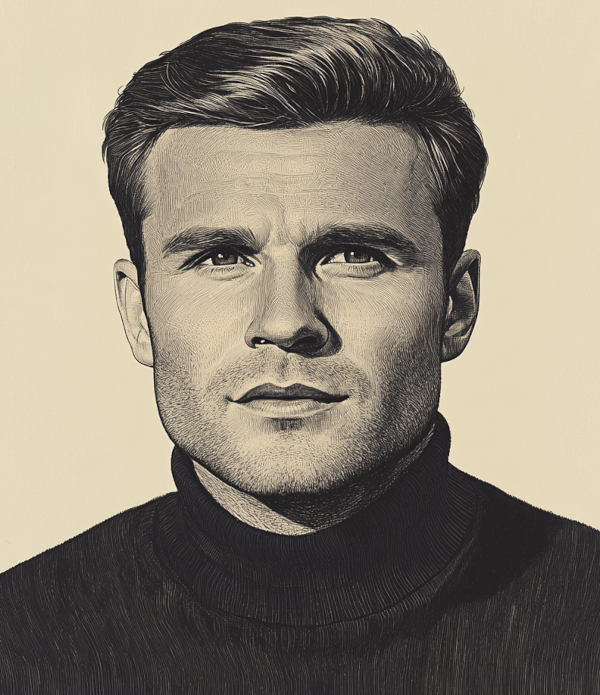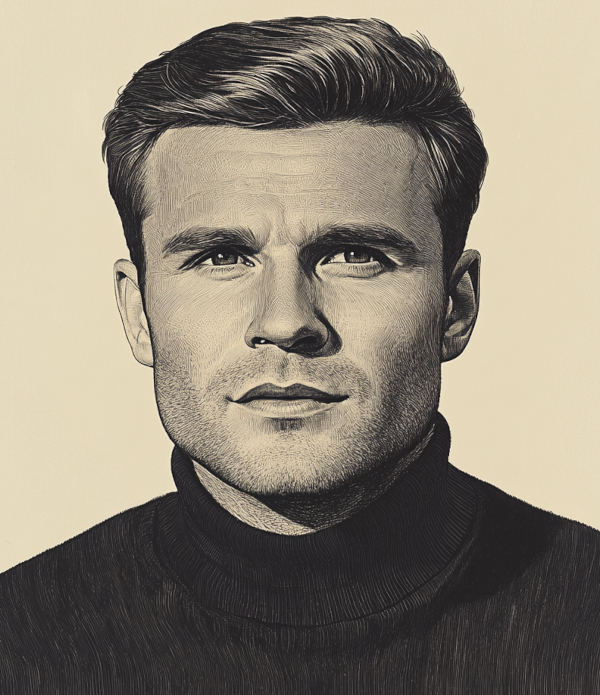


Lev Ivanovich Yashin (1929–1990) was a Soviet footballer, widely regarded as one of the greatest goalkeepers of all time. Known for his incredible reflexes, athleticism, and revolutionary playing style, Yashin was nicknamed the "Black Spider" or "Black Panther" due to his iconic black uniform and cat-like agility. He was the first, and still remains the only, goalkeeper to win the Ballon d'Or, which he received in 1963. Yashin spent his entire professional career playing for Dynamo Moscow and represented the Soviet Union national team in multiple World Cups and European Championships. He is celebrated for his fearless goalkeeping, leadership on the field, and his contributions to the evolution of the goalkeeper's role.
Birth and Family Background: Lev Yashin was born on October 22, 1929, in Moscow, then part of the Soviet Union. He grew up in a working-class family and experienced the hardships of World War II firsthand. During the war, Yashin's family was evacuated to the Ural Mountains, where he worked in a factory to contribute to the war effort.
Start in Sports: Yashin initially began playing football as a hobby and started as a goalkeeper at a young age. He joined a local factory team, and his talent between the posts was quickly noticed. At the age of 18, Yashin returned to Moscow and joined the youth team of Dynamo Moscow in 1949, where his career as a professional goalkeeper began.
Early Struggles and Hockey Career: Yashin's early years at Dynamo Moscow were challenging, as he had to compete with more experienced goalkeepers for the starting position. He even considered quitting football at one point, but he remained determined and continued training. Interestingly, during this period, Yashin also played ice hockey for Dynamo Moscow's hockey team, and he won the Soviet Cup in hockey in 1953. His experience in hockey is often credited with helping him develop his reflexes and quick reaction times, which later made him an exceptional football goalkeeper.
Breakthrough and Dynamo Success: Yashin eventually became the first-choice goalkeeper for Dynamo Moscow, making his professional debut in 1950. He established himself as an indispensable part of the team by the 1953 season. With Dynamo Moscow, Yashin won the Soviet Top League title five times (1954, 1955, 1957, 1959, and 1963) and the Soviet Cup three times (1953, 1967, and 1970). His consistent performances for Dynamo made him a national hero in the Soviet Union and gained him recognition across Europe.
Revolutionizing Goalkeeping: Lev Yashin is credited with revolutionizing the role of the goalkeeper. Unlike many goalkeepers of his era who largely stayed on the goal line, Yashin was known for his commanding presence and proactive approach. He would come out of his goal to intercept crosses, communicate actively with defenders, and initiate counterattacks by quickly distributing the ball. Yashin's approach to goalkeeping emphasized agility, anticipation, and shot-stopping, and he was one of the first goalkeepers to act as a "sweeper-keeper" long before the term was coined.
The "Black Spider": Yashin became known as the "Black Spider" because he almost always wore an all-black uniform during matches, and his incredible saves led opponents to joke that he had eight arms like a spider. His ability to make seemingly impossible saves gave him an almost mythical reputation, and he was also referred to as the "Black Panther" for his speed, quick reflexes, and fearless style of play.
Debut and Early Success: Lev Yashin made his debut for the Soviet Union national team in 1954. He quickly established himself as the team's first-choice goalkeeper and played a crucial role in some of the greatest achievements in Soviet football history. Yashin helped the Soviet Union win the 1956 Olympic gold medal in football, as well as the inaugural European Nations' Cup (now known as the UEFA European Championship) in 1960.
FIFA World Cup Appearances: Yashin represented the Soviet Union in four FIFA World Cups—1958, 1962, 1966, and 1970—and his performances at the international level solidified his reputation as the world's best goalkeeper. In the 1958 World Cup in Sweden, Yashin helped the Soviet Union reach the quarterfinals in their first-ever World Cup appearance. In the 1966 World Cup in England, Yashin led the Soviet team to the semi-finals, where they eventually finished in fourth place, which remains the best World Cup result in Soviet and Russian history.
Ballon d'Or (1963): In 1963, Lev Yashin made history by becoming the first, and still the only, goalkeeper to win the Ballon d'Or, awarded annually to the best football player in Europe. His performances during that year were outstanding, both for Dynamo Moscow and the Soviet national team. Yashin's achievement was significant because goalkeepers are rarely recognized in the same way as outfield players, and his Ballon d'Or win remains a unique accomplishment in football history.
European Championships and Later Years: Yashin also represented the Soviet Union in the European Championship in 1964, where the team finished as runners-up, losing to Spain in the final. He continued to play at the highest level well into his late 30s, appearing in his final World Cup in 1970 in Mexico, where he served as a backup goalkeeper and mentor to younger players.
Revolutionizing Goalkeeping: Lev Yashin was known for his commanding presence, fearlessness, and innovative approach to goalkeeping. He was one of the first goalkeepers to leave his goal line and actively direct his defense, often rushing out to claim crosses and cut off attacks before they became dangerous. Yashin's communication skills and leadership on the pitch earned him the respect of his teammates and made him an essential part of both Dynamo Moscow and the Soviet national team.
Shot-Stopping and Reflexes: Yashin was renowned for his incredible reflexes and his ability to pull off spectacular saves. He had a strong presence in one-on-one situations and was excellent at saving penalties, reportedly stopping over 150 penalties during his career—a feat that remains unmatched. His athleticism and quick decision-making set a new standard for goalkeeping and inspired future generations of goalkeepers around the world.
Work Ethic and Dedication: Yashin was known for his relentless work ethic and dedication to improving his skills. He was a student of the game who constantly analyzed his performances to correct mistakes and improve his technique. He also had a reputation for being a gentleman both on and off the pitch, earning the admiration of teammates, opponents, and fans alike.
Retirement from Playing (1971): Lev Yashin retired from professional football in 1971 after spending his entire club career—over 20 years—with Dynamo Moscow. A farewell match was held in his honor at the Luzhniki Stadium in Moscow, attended by over 100,000 fans and featuring some of the world's greatest football players. His loyalty to Dynamo Moscow and his contributions to the club made him a beloved figure in Soviet football.
Coaching and Administrative Roles: After retiring from playing, Yashin remained involved in football. He worked in various roles for Dynamo Moscow, including as a coach and administrator, and helped develop young talent at the club. He was also involved in promoting football across the Soviet Union and served as a goodwill ambassador for the sport.
Health Struggles and Passing (1990): In the latter part of his life, Yashin faced significant health challenges. In 1986, he underwent surgery that resulted in the amputation of one of his legs due to complications related to a knee injury. Despite these difficulties, Yashin continued to attend public events and remained active in football circles. He passed away on March 20, 1990, at the age of 60, due to complications from stomach cancer. His death was mourned across the footballing world, and his legacy as one of the greatest goalkeepers of all time was celebrated.
Impact on Goalkeeping: Lev Yashin's influence on the position of goalkeeper is immeasurable. He redefined the role of the goalkeeper by actively participating in defensive play and directing his teammates from the back. His proactive style of goalkeeping, which involved anticipating and neutralizing threats before they materialized, laid the foundation for the "sweeper-keeper" role popularized by later goalkeepers such as Manuel Neuer.
Recognitions and Awards: Yashin's achievements have earned him numerous accolades and honors, both during and after his career:
Statue and Monument: A statue of Lev Yashin was erected outside Dynamo Stadium in Moscow, honoring his legacy with Dynamo Moscow and the Soviet national team. His image has also been featured on Russian postage stamps, and he was commemorated during the 2018 FIFA World Cup, which was held in Russia, with his likeness appearing on the official tournament poster.
FIFA's Yashin Award: In recognition of his greatness, FIFA named the award for the best goalkeeper of the FIFA World Cup the "Lev Yashin Award." The award was given under this name from 1994 until 2006. In 2019, France Football, the organization that awards the Ballon d'Or, introduced the Yashin Trophy, awarded annually to the best goalkeeper in the world, further cementing his legacy in football history.
Lev Yashin was a groundbreaking footballer whose talent, bravery, and innovative approach to goalkeeping earned him a place among the greatest players in the history of the sport. Known as the "Black Spider" for his agility and command of the penalty area, Yashin redefined the role of the goalkeeper and set new standards for excellence. His contributions to Dynamo Moscow, the Soviet Union national team, and the game of football are unparalleled, and his legacy endures as an inspiration to goalkeepers around the world.
As the only goalkeeper to win the Ballon d'Or, Lev Yashin's career is a testament to the importance of goalkeepers in the game of football. He not only demonstrated incredible skill and athleticism but also showed the importance of leadership and communication from the back. Yashin’s impact on football is not just measured by his trophies and accolades but by the countless goalkeepers who have followed in his footsteps, striving to emulate his greatness between the posts.

We use cookies
We use cookies and other tracking technologies to improve your browsing experience on our website, to show you personalized content and targeted ads, to analyze our website traffic, and to understand where our visitors are coming from. Privacy Policy.